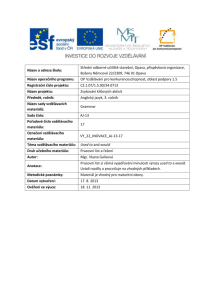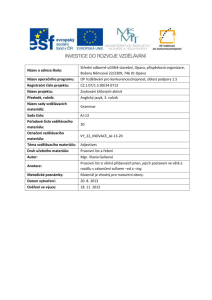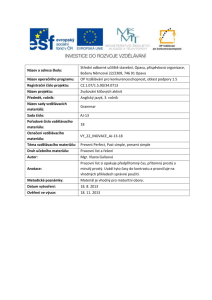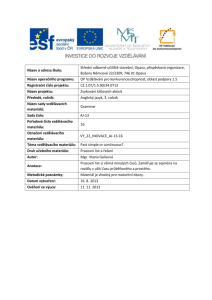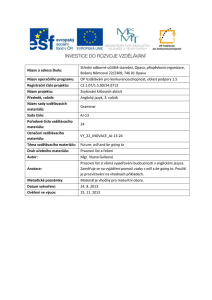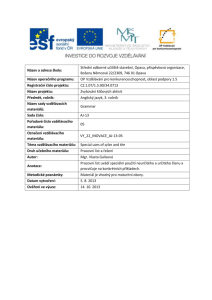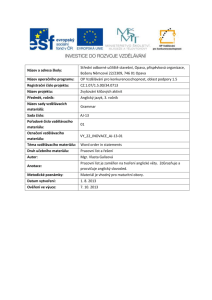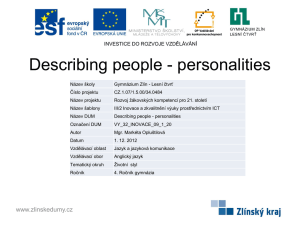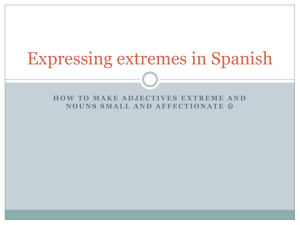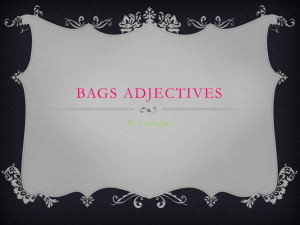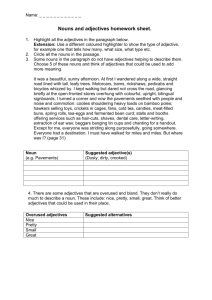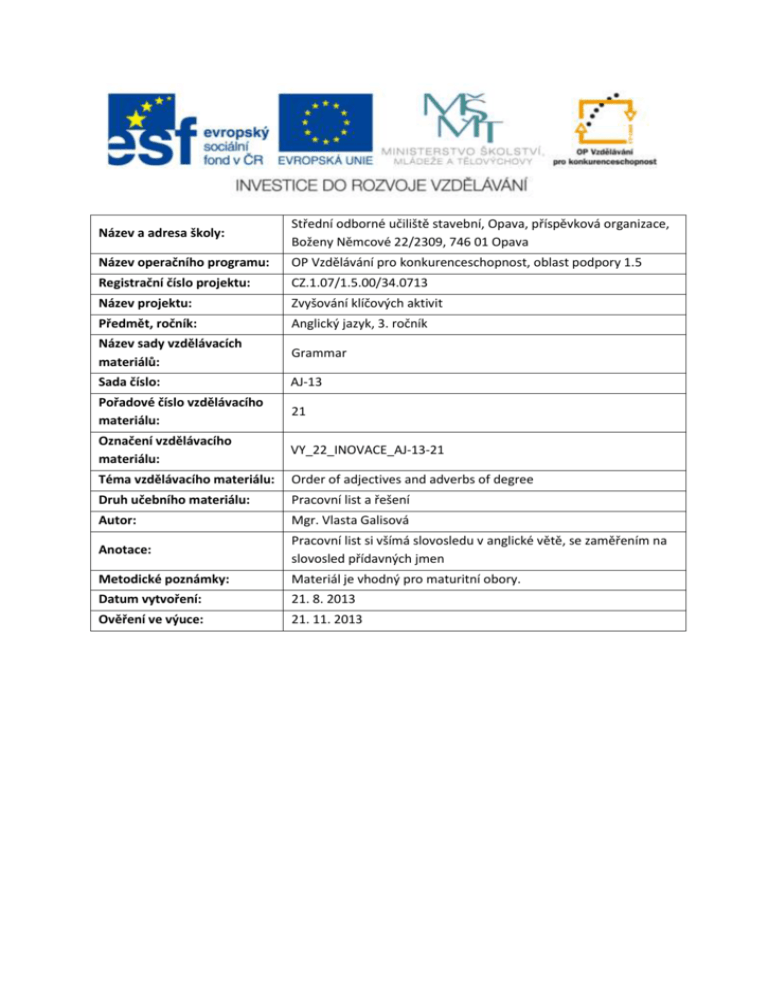
Název a adresa školy:
Střední odborné učiliště stavební, Opava, příspěvková organizace,
Boženy Němcové 22/2309, 746 01 Opava
Název operačního programu:
OP Vzdělávání pro konkurenceschopnost, oblast podpory 1.5
Registrační číslo projektu:
CZ.1.07/1.5.00/34.0713
Název projektu:
Zvyšování klíčových aktivit
Předmět, ročník:
Anglický jazyk, 3. ročník
Název sady vzdělávacích
materiálů:
Grammar
Sada číslo:
AJ-13
Pořadové číslo vzdělávacího
materiálu:
21
Označení vzdělávacího
materiálu:
VY_22_INOVACE_AJ-13-21
Téma vzdělávacího materiálu:
Order of adjectives and adverbs of degree
Druh učebního materiálu:
Pracovní list a řešení
Autor:
Mgr. Vlasta Galisová
Anotace:
Pracovní list si všímá slovosledu v anglické větě, se zaměřením na
slovosled přídavných jmen
Metodické poznámky:
Materiál je vhodný pro maturitní obory.
Datum vytvoření:
21. 8. 2013
Ověření ve výuce:
21. 11. 2013
Review:
Order of adjectives
We put adjectives describing type of purpose next to the noun. These
adjectives are often part of the noun.
A long steel hunting knife… (=knife used for hunting)
We put “opinion” adjectives before others.
An amazing long steel hunting knife…
opinion
size
(a)valuable large
shape
round
age
colour origin
Italian
(an)old red
material Type/purpose NOUN
bedroom
Mirror
silk
wedding
dress
Be careful! We do not usually use more than three or four adjectives in front of
a noun. If we want to give more information we use another clause or sentence.
Making adjectives stronger or weaker
WEAKER
A little/a bit/slightly fairly quite rather/pretty
very
STRONGER
really extremely
A little; a bit = after nous.
The book was a bit expensive.
Rather = with negative adjectives.
The test was rather difficult.
Rather; quite = with positive adjectives is something surprising
The lesson is rather interesting. (=more than I expected)
Practice:
1. Put the word in brackets in the correct order and complete the
sentences.
0 Samira owns a lovely old French armchair. (French, lovely, old)
1 Tom lives in a……………....………cottage by the sea. (stone, little,
pleasant)
2 We bought a …………...………chest of drawers for the bedroom.
(wooden, big, new)
3 Did Melinda wear her …………………..…dress to the party? (pretty,
silk, blue)
4 Their new house has a ……………………room. (living, big, new)
5 John gave her………………………….picture frame. (round, silver,
small)
6 Rembrandt was a ……..………………artist. (seventeenth-century, Dutch,
famous)
7 It´s one of those ……………………machines. (German, washing,
expensive)
8 Where´s that ……………………..……T-shirt you used to wear? (cotton,
red, horrible)
2. Read the sentences and choose the best words in Italics for each
meaning.
0 That meal was really expensive! less/more expensive than I expected
1 I need something a little larger. much/slightly larger
2 The weather´s pretty hot here.
very/not very hot
3 I was shocked by that film – it was rather violent. more violent than/not
as violent as I like
4 I am sorry I´m a bit late.
a few minutes/ a several hours late
5 She´s quite a good artist, despite her lack of training. better than/not as
good as I expected ceilings
6 This train is extremely fast.
very/not very fast
3 Write a few sentences with different type of adjectives and adverbs
making these adjectives stronger or weaker.
……………………………………………………………………………………
……………………………………………………………………………………
……………………………………………………………………………………
……………………………………………………………………………………
……………………………………………………………………………………
……………………………………………………………………………………
……………………………………………………………………………………
Key:
Ex. 1
1.
2.
3.
4.
5.
6.
7.
8.
Pleasant little stone
Big new wooden
Pretty blue silk
Nice big living room
Small round silver
Famous seventeenth-century dutch
Expensive German washing
Horrible red cottn
Ex. 2
1 slightly 2 very 3 more violent than
4 a few minutes 5 better than 6 very
Ex. 3
Student´s own answers.
Literatura:
SWAN, M. Oxford English Grammar course intermediate. Oxford: OUP, 2011.
ISBN 978-0-19-442082-2.
DAVIS, F.; RIMMER, W. Active Grammar with answers Level 2. Cambridge:
CUP, 2011. ISBN 978-0-521-17599-9.
FOLEY, Diane Hall and Mark. My grammar lab. 1. publ. Harlow: Pearson
Longman. ISBN 978-140-8299-159.

